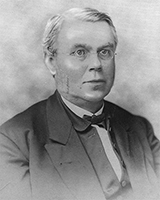 Thomas Murphy
Thomas Murphy
Devoted piety will make all the work of the pastor easy and pleasant.
This is another consideration upon which great stress should be laid. Such piety is unspeakably important, not only for God’s glory and the benefit of souls, but also for the pastor’s own comfort. It is in this, and not in superior talents or cultivated taste, or in a pleasant charge or attractive social relations, that his real enjoyment is to be found.
Without that warm love to God and his work the ministry must prove but a life of drudgery and hypocrisy. The mistaken man who holds it must constantly assume an interest in spiritual things which he does not feel. He must speak with an emotion which he has to force.
He must even strive to maintain a character that is not natural to him. It is a humiliating thing to be such a minister as this. It is to toil on and on in a work in which there is no heart and no pleasure, and scarcely any good to be expected.
All other motives than the constraining love of Christ in the heart soon lose their influence. There are no doubt other incentives, such as ambition, love of learning and desire for social influence, that may carry forward a minister for a while with apparent pleasure. But they will not stand the wear and tear of years of drudgery and trial. If the pastor who is chiefly actuated by these is successful, they will soon satiate; if he is not as successful as he expected to be, he becomes discouraged and disgusted with his office. If there is nothing more than these, the ministry soon becomes a miserable failure.
But when the love of Christ reigns in the heart supremely, it gives an impulse to the whole life that is ever steady and joyous. The wear and tear of toiling years will not wear it out. Sometimes there may appear only little success, but it has a faith that lays hold of the promises and is not discouraged. Through prosperity or adversity, among friends or enemies, in failing or continuing health, it moves steadily forward, impelled by an inward affection that cannot be quenched. Instead of years and trials wearing it out, it only grows stronger and stronger with the lapse of time. It constantly intensifies as more and more is seen of the love of Christ and the value of souls.
When earnest godliness reigns within it turns the whole life of the minister into a work of love. Souls then seem so precious that too much cannot be done to save them. Christ is so dear that everything which can possibly be contrived for his glory is a delight. There can be no rest unless something be undertaken for him every hour. Even hard duties then become a pleasure; or, rather, there are no hard duties, for supreme love to Christ makes duty and pleasure to be identical.
Thus it is that by supplying the holiest of motives, by giving a keen perception of what should be done, by quickening the faculties, and by imparting a lively sense of the Holy Spirit s aid, devoted godliness makes all the work of the sacred office easy and prosperous.
In fact, the calling of the pastor is the happiest and most noble calling in the world when his piety is of this elevated character. There may be apparent drawbacks to his comfort arising from poverty, or opposition of unreasonable men, or want of honor from the world, but all is more than made up by his hidden springs of spiritual joy. The minister who is imbued with a heavenly unction is blest with the honor that cometh from God, and with the assurance of the divine friendship. Good men will do him reverence, for they are gifted with the same spiritual instinct. The approbation of conscience will be to him a perpetual feast. He may see the appalling evils of sin wherever he turns, but he will have the indescribable pleasure of helping to remove or alleviate those evils. When the same mind is in him that was in Christ Jesus, then his life-work will consist in doing that which he loves best that which he knows will be for the glory of his best Beloved, his heavenly Friend. His work on earth will prove the perpetual delight of laying up treasure in heaven. In reality, his life on earth will be but the beginning of his heavenly happiness. And all ministerial biography shows that the men who have been the most holy have also been the most happy in their work. When, like Rutherford, they have lived under the influence of a constant unction from on high, they have also breathed the very blessedness of the upper sanctuary. The more devoted, the more joyous they have been. The whole life of such eminently pious ministers is a joy. To make the attainment of this ministerial happiness an object of pursuit is not unscriptural, for even Christ charged his disciples: “Ask, and ye shall receive, that your joy may be full.”
